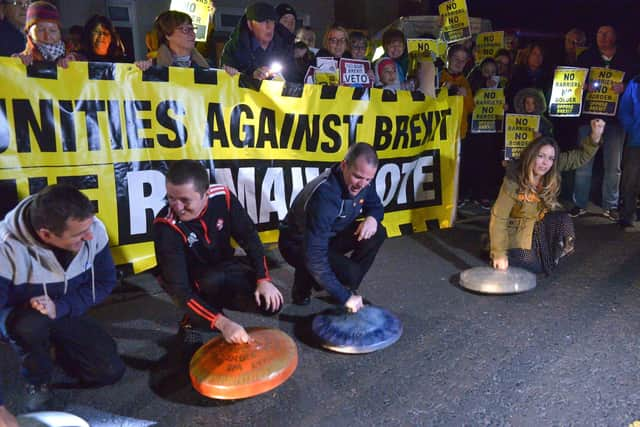Partition ‘represents a century of failure’ - call for border discussion
and live on Freeview channel 276
A motion to this effect was brought forward to members by Sinn Féin Councillor Michael Cooper at the recent Full Council meeting in December.
Colr. Cooper said: “The logic of this is both the historical logic of it, but more importantly the current and future rationale for this Motion.
Advertisement
Hide AdAdvertisement
Hide Ad“In terms of partition itself it was imposed 100 years ago against the democratically expressed will of the vast majority of the people across this island through the Government of Ireland Act, which became law exactly 100 years ago in December 1920 and from our perspective, Partition represents a century of political, economic, social and cultural failure.


“The repeal of the Government of Ireland Act by Westminster was secured by Sinn Féin during the Good Friday Agreement negotiations but we all know Partition remains a continuing barrier to economic and social progress across the island.
“The need for a one island approach across our public services, and in particular across our economy has been starkly demonstrated by the Covid pandemic. Partition also means that Brexit, in a ‘with or without’ British/EU trade deal will be hugely damaging for Ireland, especially for the border counties and the six counties state.
“The Good Friday Agreement provides for a referendum on Irish unity, from our perspective the onus is on the British Government to set that process in motion and it’s incumbent on the Irish Government to work to achieve the outcome as well.
Advertisement
Hide AdAdvertisement
Hide Ad“It’s our clear view the best interests of our people will be served by an opportunity to vote in a referendum on Irish unity, to obtain the constitutional change we need to achieve a new, agreed Ireland which respects the right of all the Irish people to national self determination and treats all of our citizens as equal.”
The SDLP supported the motion, with Councillor Martin Reilly commenting: “The key to this Motion is the fundamental right of citizens to have their say on the future of this island. That conversation has to take place, is taking place and no doubt when people have the chance to have their say at the ballot box the democratic wishes of the people of this island should be respected.”
DUP Alderman David Ramsey spoke out against the Motion, saying; “We welcome and support the framework provided by the peace process in allowing democratic methods to move us forward.
“The Good Friday Agreement is clear about what is needed before the border poll can be called. These include a sustainable devolved government in Stormont being the first. Most would agree that it is not sustainable after many breakdowns over the years due to mistakes and political opportunism. A date can’t be set for a border poll yet because everyone knows unless there is a sizeable majority agree to a United Ireland, it is doomed to fail as this will cause deeper divisions as unionist people will rise against what they see as a victory for those who murdered and destroyed relationships and lives forever.
Advertisement
Hide AdAdvertisement
Hide Ad“There is no feeling to unite Ireland amongst unionism of all persuasions. Unionism is not just a Protestant thing, it’s about livelihoods, health, welfare and the security of being part of the fifth strongest economy in the world. This Motion is about forcing a referendum and creating a sectarian headcount and causing hurt and fear within the broad unionist community,” he claimed.
The Motion was passed with 23 votes in favour, 13 against and three abstentions.
By Gillian Anderson
Local Democracy Reporter